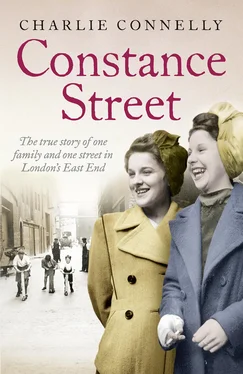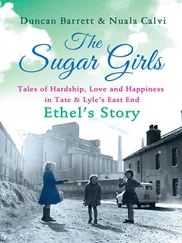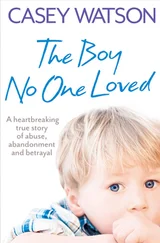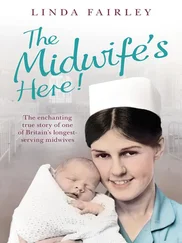‘Silvertown is perfect!’ the deskbound map-pinners who make these kinds of decisions had said. ‘Ideally located and with a ready-made workforce to boot!’
The residents of Silvertown, while not openly dissenting, were uneasy; its saloon bars and back parlours murmuring with reservations through pursed lips about high explosives and packed streets of jerry-built houses. When they were preparing to open the plant, Harry had gone down there to see about some work but had come back shaking his head and sucking his teeth. ‘Don’t like the look of it, doll,’ he’d said to Nell. ‘They’re going to work all round the clock, shift work, means there’ll be constant deliveries of dangerous stuff day and night – there’s so much of it that trucks aren’t enough: they’re bringing it in on trains and barges as well. And they’re just moving in and starting straight away, when the place is set up for making caustic soda, not bombs. The people I spoke to down there seem out of their depth, to me. Got a bad feeling about it.’
Brunner Mond’s going up would make a warped kind of sense, thought Nell, as she began to notice strange golden speckles falling from the sky that danced in the air around them, billows of brilliant orange pinpricks that glowed and flared in the breeze and died wherever they landed. Jacob Eid, the baker, picked one from his jacket sleeve and examined the small black speck in the palm of his hand. He lifted it to his nose and sniffed it.
‘It’s wheat grain,’ he said, incredulously, holding it up between finger and thumb like a jeweller inspecting a precious stone. ‘This is wheat grain. Lord save us, don’t tell me the flour mill’s gone up too.’
The gathering at the corner of Constance Street fell silent and looked for a while at the western sky still burning bright orange as if the sun was clinging to the horizon and refusing to set. On the breeze rumbled the low, malicious thunder of distant flames. They all stood for a while, wordless, helpless, fearful, hands thrust into pockets and collars turned up against the cold, feeling occasional wafts of smoky warmth drifting across from the west.
And then they came. Out of the smoke, out of the glow, out of the darkness, among the billow of golden sparks: the people. A trickle at first, the advance party of the bewildered and the injured. A woman, wide-eyed in a torn coat, swivelling from side to side as she walked, shouting ‘Billy!’ at the buildings on one side of the street and then the other. A young man, deathly pale, his eyes dark and sunken, blood pouring down the left side of his face and neck, staining his jacket, glassy-eyed, looking ahead but looking at nothing, just walking, just getting away. A mother, hand in hand with two young children, all three of them blackened and shiny, repeated, at nobody in particular, ‘It’s gone. All of it. It’s all gone.’
Nellie watched them pass and saw more following behind, a shuffling stream of humanity, uncomprehending, mouths open, breath clouding in the chill evening, eyes seeing nothing, a parade of the shocked, a carnival of casualties. She leaned down to Norah and spoke directly into her ear.
‘Go home, Norah. I’ll be along in a minute.’
Once she’d watched her daughter run back along the street and turn into the doorway of the laundry, she looked back at those passing the end of Constance Street. It was like a parade of the damned. The wind changed, turned to the south and sent the clouds of smoke across the river, giving central Silvertown some relief from the oily smoke and brightening the streets a little, courtesy of the eerie orange glow.
Nell thought of baby Rose, a tiny pinprick of innocence among all this dread, while watching the shuffling procession pass by from a catastrophe whose scale those gathered at the corner of Constance Street could only guess at. She closed her eyes, and pictured bending her head to press her nose to Rose’s cap and breathing in a mixture of soap and baby. She became overwhelmed by a need to protect. The image of Rose, face down on the floor surrounded by glass and debris, came into her mind and made her shudder. These people, these wild-eyed, waxy-pale husks of humanity, they were all Rose to somebody. None of them deserved this. Whatever had happened over there, whatever horrors lay a few hundred yards to the west, had as far as she could deduce left these people with nothing. As well as their physical injuries they were all in a state of nervous shock, driven on by a base human instinct to get as far away from danger as possible. A wave of maternal compassion ran over her. These were her people, Silvertown people, yet they were suddenly otherworldly and vulnerable. She stepped into the street to a young man whose left arm was hanging at a sickening angle.
‘Here, boy,’ she said, and then, louder, ‘and anyone else, come with me,’ she called. ‘I’ve a laundry up this way. You can shelter there until …’ Until what? She wasn’t sure. ‘Tell you what, we’ll all have a nice cup of tea.’ She heard the words come out of her mouth and almost winced at the triteness of them, but this was the banality of disaster: normal was good, normal was what you needed at a time like this, and there’s nothing more normal than tea.
Thus Nellie Greenwood, businesswoman, wife and mother of ten, just embarked on her fortieth year, led a gaggle of the broken and bewildered along Constance Street to the battered and shattered business she ran with her husband with help from her daughters. She wasn’t entirely sure what she was going to do with them when she got there, but she knew that right now they needed her more than anything in the world.
Nellie Greenwood was my great-grandmother and I never knew her. At least, I never knew her in the sense that she’d died before I was born. Such was her legacy, however, such the force of her personality and the mixture of affection and fear she’d instilled in those who grew up with and around her, that I’ve almost manufactured false memories of Nell of my own. So powerful was her character that photographs familiar from albums and mantelpieces move and talk in my mind.
Nell was ‘Gran’ to everyone, whatever their generation, the matriarch, the central node around whom all family business and life was conducted. A formidable working-class woman who’d forged a business from nothing, who’d worked hard all her life, asked for nothing and expected nothing, bore thirteen children of whom five didn’t survive to adulthood, while informally adopting at least one other, and who despite knowing hardship, frustration, tragedy and loss, and never being less than forthright, opinionated and frank, never lost the deep and innate kindness that underpinned her life.
It’s thanks to Nellie that Silvertown was, is, and will most likely continue to be, for another couple of generations at least, regarded as home by my mother’s family even though none of us has lived there for more than seventy-five years. Between the wars Nellie was the heart of the family and the heart of Constance Street, which in turn was the heart at the centre of Silvertown, a community in east London isolated between the docks and the river where Nellie and the rest of the Greenwoods allowed their roots to embed in the marshy earth. Silvertown is, as my grandmother would frequently remind me, an island – because of the docks you have to cross water to leave – and an island mentality developed there. A closeness of kin and a bond to a place that formed ties so tight it would take something spectacular to break them. The physical ties would indeed be broken in such a fashion, but the spiritual ones linger and show no sign of weakening any time soon. ‘You’ve got dock water in your veins, boy,’ my grandmother Rose would tell me, ‘and don’t you forget it.’
Читать дальше












